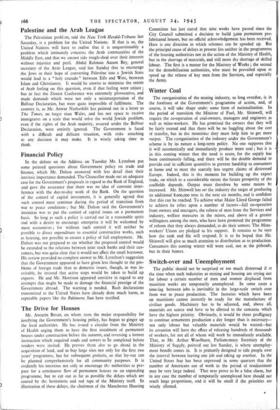Financial Policy
In the debate on the Address on Tuesday Mr. Lyttelton put some pointed questions about Government policy on trade and finance, which Mr. Dalton answered with less detail than their intrinsic importance demanded. The Chancellor made out an adequate case for the Government's proposals in regard to the Bank of England, and gave the assurance that there was no idea of constant inter- ference with the day-to-day work of the Bank. On the question of the control of capital investment, it is generally agreed that such control must continue during the period of transition from war to peace conditions ; but Mr. Dalton said the Government's intention was to put the control of capital issues on a permanent basis. So long as such a policy is carried out in a reasonable spirit and with a desire to encourage enterprise it will be welcomed by most economists ; for without such control it will neither be possible to direct expenditure to essential constructive works, such as housing, nor possible to ensure a policy of full employment. Mr. Dalton was not prepared to say whether the proposed control would be extended to the relations between joint stock banks and their cus- tomers, but was quite clear that it would not affect the small borrower. His review provided no complete answer to Mr. Lyttelton's suggestion that the Government appeared to have given less thought to the pro- blems of foreign trade than to domestic issues, though, as was in- evitable, he insisted that active steps would be taken to build up exports. He and Mr. Morrison appeared sensitive in regard to any attempts that might be made to damage the financial prestige of the Government abroad. The warning is needed. Rash declarations transmitted to the United States have already done much harm, as reputable papers like the Baltimore Sun have testified.






















 Previous page
Previous page